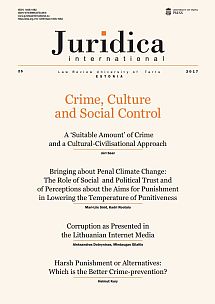Explaining the Relationship between Social Trust and Value Similarity: The Case of Estonia
DOI:
https://doi.org/10.12697/JI.2017.25.02Keywords:
social trust, human values, value similarity, European Social SurveyAbstract
The article is dedicated to explaining why value similarity fosters generalised social trust in high-trust societies. Previous findings by Beilmann and Lilleoja suggest that value similarity is more important in generating individual-level social trust in countries where the overall levels of social trust are higher, while in countries with a low level of social trust, congruity of the personal value structure with the country-level value structure tends to be coupled with lower trustfulness on the part of individuals. The article explores the meso-level indicators that could explain this relationship. The relationship between social trust and human values was examined in a sample of 2,051 people in Estonia, using data from the European Social Survey, round 7. The results suggest that when differences in socio-economic factors are controlled for, value similarity remains a significant factor in fostering generalised social trust in Estonian society. However, its direct effect is relatively low when compared with predictors such as trust in certain institutions, economic well-being, and ethnicity. Trust in the legal system and the police plays a particularly important role in fostering generalised social trust in a high-trust society wherein people believe that other people in general treat them honestly and kindly.


